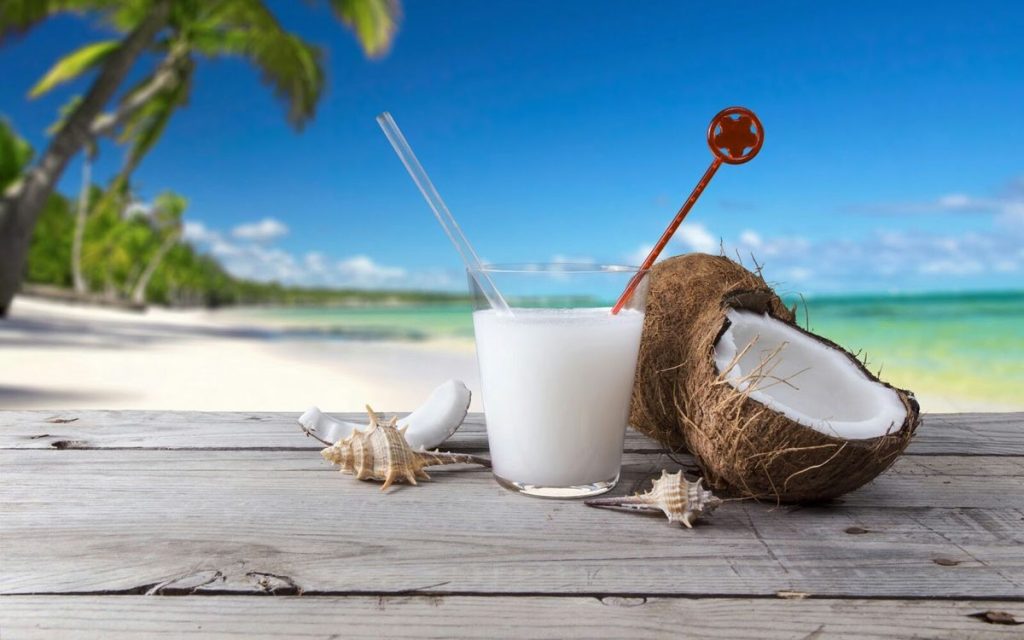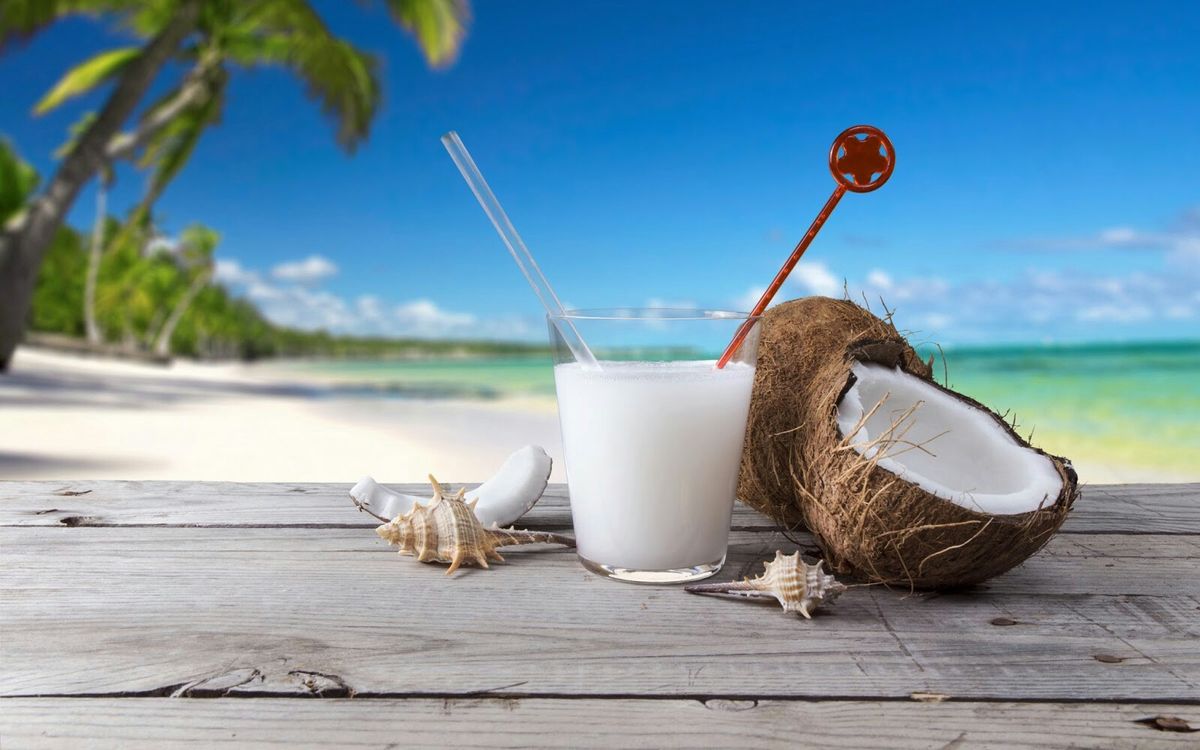Don’t Drink Coconut Water Until You Know These Key Facts
One of the most well-liked natural beverages in the world today is coconut water. Promoted as a hydrating, refreshing, and healthful beverage, it is frequently seen as a better option than soda and sports drinks. Although coconut water has many health advantages, not everyone can benefit from it. Drinking it without being aware of its key advantages, facts, and possible drawbacks might worsen rather than enhance your health.
Everything you need to know before incorporating coconut water into your daily routine will be covered in this post.
The transparent liquid within young, green coconuts is called coconut water. Coconut water is inherently low in calories and fat, in contrast to coconut milk, which is prepared from the flesh of mature coconuts. It is particularly well-liked by athletes and health-conscious people because of its unusual combination of electrolytes, vitamins, minerals, and antioxidants.
Before consuming coconut water on a daily basis, you should be aware of certain crucial facts, even if it could look like a miraculous beverage.
Coconut Water’s Nutritional Properties

240 milliliters (1 cup) of coconut water typically contains:
45–60 calories
9 g of carbohydrates
6–8 g of natural sugar
Protein: less than 2 grams
Fat: less than 1 gram
About 600 milligrams of potassium (more than a banana)
250 milligrams of sodium
60 mg of magnesium
40–50 mg of calcium
Vitamin C: In trace concentrations
Antioxidants: phenolic chemicals and cytokininsBecause of its nutritional makeup, coconut water is great for staying hydrated and restoring electrolytes, but it also means you need to watch how much and when you drink it.
Coconut Water’s Health Benefits
Let’s examine the established health advantages first, then the risks:
1. Hydration Booster
Due to its high potassium, sodium, and magnesium content, coconut water is a great way to rehydrate after physical activity, hot weather, or illness.
2. Promotes Heart Health
According to studies, potassium in coconut water may help reduce blood pressure, which lowers the risk of heart disease and hypertension.
3. Facilitates Digestion
Its fiber content and natural enzymes can help promote a healthy digestive system and lessen issues like constipation and bloating.
4. Drinks That Are Good for Your Weight
Coconut water is a far better option than bottled juices or sugary drinks since it is low in calories and fats.
5. Properties of Antioxidants
Long-term health is supported by the antioxidants in coconut water, which lessen oxidative stress and shield cells from harm.
Do not drink coconut water unless you know these facts.
Although coconut water is beneficial, not everyone should drink it, and too much of it may be harmful. Before forming it into a regular routine, you should be aware of the following important facts:
1. High Potassium (Excessive Potassium Can Be Hazardous)
Because of its high potassium content, coconut water is frequently referred to as “nature’s sports drink.” However, hyperkalemia, a condition brought on by an excess of potassium, can result in:
Unusual heartbeat
Weakness in muscles
strain on the kidneys
Even cardiac arrest under extreme circumstances👉 Reduce your intake of coconut water if you currently eat foods high in potassium, such as spinach, avocados, and bananas. Overconsumption must be avoided by patients suffering from renal disease.
2. It Cannot Be Used in Place of Plain Water
Although coconut water is hydrating, it shouldn’t be used in place of regular water. Consuming excessive amounts of alcohol might increase your intake of calories and sweets. Always consume enough plain water each day to balance out coconut water.
3. Potential Impact on Blood Sugar Levels
Despite its natural sugar content, coconut water can cause blood glucose levels to rise, particularly when eaten in high quantities. Before forming a regular routine, people with diabetes or prediabetes should keep an eye on their consumption and speak with a physician.
4. Not Adequate for All Individuals with Kidney Issues
For healthy people, coconut water can help avoid kidney stones, but people with chronic kidney disease (CKD) need to exercise caution. In some patients, elevated potassium levels may deteriorate renal function.
5. Could Lead to Hypotension
Because coconut water contains potassium, it naturally lowers blood pressure. Combining both blood pressure drugs can result in dangerously low blood pressure (hypotension) for those who are already on both.
6. May Cause Electrolyte Disproportion
Although coconut water is frequently advertised as an alternative to sports drinks, consuming too much of it can lead to potassium and sodium imbalances, especially in people with health issues. Instead of hydration, this imbalance may cause weakness, lightheadedness, and dehydration.
7. Not the Best Option Prior to or Following Surgery
Because coconut water’s effects on blood pressure and electrolytes might interfere with anesthesia and recovery, doctors frequently advise patients to avoid it both before and after surgery.
8. Potential Reactions to Allergies
Although they are uncommon, allergic reactions to coconut water might include rashes, itching, or irritation of the throat in certain people. You should quit drinking it right away if you experience these symptoms.
8. Additives May Be Present in Commercial Coconut Water
Store-bought coconut water isn’t always natural. Some manufacturers lessen its health advantages by adding sugar, flavorings, or preservatives. Make sure you always read the label and get pure, unsweetened coconut water.
How Much Is Safe to Drink from Coconut Water?
One cup (240 ml) per day is safe and beneficial for hydration for the majority of healthy persons. After a strenuous workout, athletes may consume up to two cups (480 ml).
Drinking more than three cups a day might result in an excessive potassium consumption, which can be harmful to your health.
Who should avoid coconut water?
Although many people find it healthful, other groups should exercise caution:
Individuals suffering from renal disease
People who have hyperkalemia (high potassium levels)
People taking blood pressure drugs
Diabetes patients (should watch intake)
Patients having surgery or recuperating from it.
When It’s Best to Drink Coconut Water
The following are the best times to consume coconut water in order to optimize advantages and minimize risks:
Having an empty stomach in the morning improves digestion and hydration.
Restoring lost electrolytes after exercise
Prevents dehydration in hot conditions
When taken in moderation with meals, it helps with digestion.
Because of its natural sugars and diuretic impact, it should not be consumed late at night.
A natural, nourishing, and pleasant beverage, coconut water can help with digestion, heart health, and hydration. It’s not as innocuous as it first appears, though. You must consume it mindfully and in moderation because to its high potassium, sugar, and possible blood pressure consequences.
Take into account your lifestyle, medicines, and medical problems before including coconut water into your daily diet. Balance is essential with any natural medicine since too much of a good thing may become detrimental.
Therefore, unless you are aware of these crucial facts, avoid drinking coconut water. Once you do, use it responsibly for the greatest possible health advantages.




